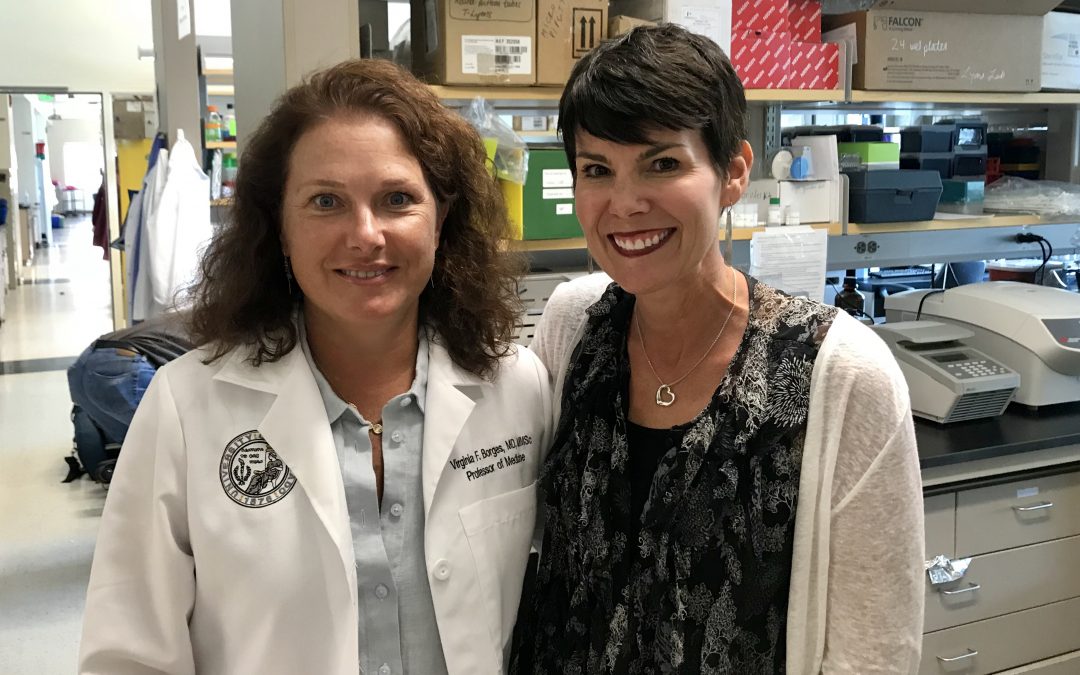“It’s the best time in cancer medicine since I became a doctor 20 years ago.”
Virginia Borges, MD says that when referring to the a national research study the University of Colorado Cancer Center and its clinical partners at UCHealth have joined.
“It is opening a tremendous number of doors,” Dr. Borges says. “It is giving our patients the opportunity to participate in research on a scale that is unprecedented. It is giving them the opportunity to be partners with us in the fight against cancer.”
ORIEN is the name of this groundbreaking and vast study. ORIEN stands for the Oncology Research Information Exchange Network. Researchers across the country are examining all cancers and then, sharing their findings, collaborating on their findings and discovering more effective treatment therapies.
“People tend to think of cancer from the body part from which it arises,” Dr. Borges says. “But, one of my patients might come on board to help us understand breast cancer and he or she may end up benefiting leukemia.” Dr. Borges treats breast cancer patients, primarily young women who are diagnosed. Borges is also the ORIEN Principal Investigator at CU Cancer Center on the Anschutz Medical Campus
To enroll in ORIEN, participants at CU Cancer Center consent to the Total Cancer Care Protocol. To start off, a small section of their tumor is taken after the tumor is removed from the patient. That tissue will be thoroughly examined and stored for future examination and analysis. The only thing else asked of patients is that they provide a few extra tablespoons of blood during regularly-scheduled draws, urine samples during doctor appointments and regular updates on their health.
Stephen Estrada-Erskine was only 28-years-old when he got very sick, very quickly.
“It started off as a dull ache in my stomach,” Stephen says. “It got to the point where I was walking up and down the street at 3 o’clock in the morning so I could walk off the pain.”
Stephen was diagnosed with Stage 4 Colorectal Cancer in July of 2014. Four years later, he is grateful to be alive and is one of the thousands of Colorado participants in ORIEN.
“I feel I would be doing a disservice to the world by not donating just one small tube of blood,” Stephen says. “Your blood can seriously help someone else so if you can help one person not go through what you’re going through or help in the long run cure to cancer, because you signed up for the ORIEN project, it’s an incredibly exciting thing.”
Stephen not only tries to encourage other cancer patients to enroll in ORIEN, he also provides support to others going through the disease he has faced as a community engagement coordinator and certified patient navigator at Colorectal Cancer Alliance.
“When I tell patients that they need to become educated and empowered, that’s not just with their treatments,” Stephen says. “There are trials. You need to become educated after diagnosis and not when it’s too late and that includes things like the ORIEN project. They’re collecting so much data.. and data that we may never see and never know the benefits.. but we know that it’s helping someone.”
“ORIEN will absolutely jump fold the pace at which we’re able to figure out things and go back to the patients, the people who are helping us do this work and maybe even benefit some of them directly,” Borges says.
It is not out of the realm of possibilities that by participating in ORIEN, an individual with cancer could be switched to new treatment options because of findings discovered under a microscope. That could happen in a lab on the Aurora campus on in a lab across the country that is looking into the targets that affected the patient’s specific tumor cells.
“This allows us to go from one institution working hard to a much larger scale where you’ve got a high number of leading institutions across the United States coming together and everyone is focused on the same goal,” Dr. Borges says. “This is thousands of people across these institutions, all churning the wheel to find answers, therapies and cures. There are unlimited possibilities of what we will learn because the patients sign on for life and help us understand the long road they travel. Something that we learn from someone with leukemia may turn around and help us find a cure for colon cancer.”
This story was produced so that CU Cancer Center can present potential participants everything they need to know about ORIEN and why it’s so vital to the future care of cancer patients.

Recent Comments